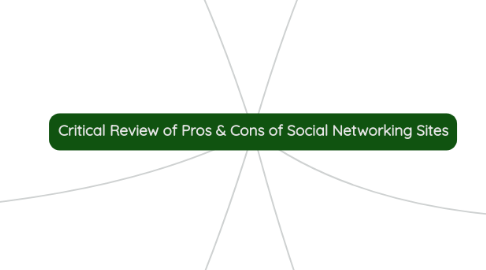Critical Review of Pros & Cons of Social Networking Sites
by Monica Hoi

1. References
1.1. Grant, Kelli B. 2017, Identity theft, fraud cost consumers more than $16 billion. Retrieved April 12, 2018, from Identity theft, fraud cost consumers more than $16 billion
1.2. Wallace, Kelly 2015, Teens spend a 'mind-boggling' 9 hours a day using media, report says. Retrieved April 12, 2018, from Teens spend 9 hours a day using media, report says - CNN
1.3. Hadad, Chuck 2015, Why some 13-year-olds check social media 100 times a day. Retrieved April 12, 2018, from #Being13: Teens and social media - CNN
1.4. Simon, Mallory 2008, Student 'Twitters' his way out of Egyptian jail. Retrieved April 18, 2018, from Student 'Twitters' his way out of Egyptian jail - CNN.com
1.5. Harkins, Paighten 2018, A Wasatch High School student is arrested after making a social media threat. It’s the second threat reported there in a week. Retrieved April 18, 2018, from A Wasatch High School student is arrested after making a social media threat. It’s the second threat reported there in a week.
2. Body paragraph 3
2.1. However, it is incorrect to state that social networking may get a person out of prison.
2.2. This is because social networking does not have any political authority to aid citizens who are involved in an international conflict.
2.3. For example, an international case concerning an American graduate student, James Karl Buck, who was arrested in Egypt in 2008 that was said to have tweeted his way out of jail.
2.4. However, according to Simon (2008), James claims that social networking was merely a platform to notify others of his current condition and his rights as an American was the factor that facilitated his release from jail.
2.5. On the contrary, social networking could land individuals in jail for crimes they commited unknowingly.
2.6. This is due to the lack of exposure among netizens towards the consequences faced when boundaries on freedom of speech are crossed in social networking sites.
2.7. According to Harkins (2018), 'A Wasatch High School student was arrested Wednesday after someone alerted police of a social media threat. After being taken into custody, the student didn’t understand the consequences of making the post, according to a notice on the Wasatch County School District’s website.'
3. Conclusion
3.1. In a nutshell, it is shown that social networking allows easy access for identity thieves to commit crime on different social media platforms.
3.2. Moreover, the overwhelming nature of social networking causes teenagers to be addicted and overly-conscious of their social media accounts.
3.3. However, social networking is unable to release an individual out of jail and is actually more prone to land you in jail.
3.4. All in all, we should utilise social networking sites wisely to prevent exploitation of information, addiction and getting into prison. Social networking sites can be very beneficial if we use them for the right purposes and intentions.
4. Introductory paragraph
4.1. The article entitled "What are the pros and cons of social networking sites?" written by Strickland reports on merits and flaws of social networking sites.
4.2. Pros of social networking sites are:-
4.3. - Social networking allow users to make connections with other people
4.4. - Social networking allow users to organise events and invite friends easily
4.5. - Social networking allow individuals to network professionally
4.6. - Social networking allow users to promote an artiste's or actor's work
4.7. - Social networking acts as application platforms
4.8. - Social networking may even get someone out of jail
4.9. Cons of social networking sites are:-
4.10. - Social networking makes identity theft easier
4.11. - Social networking serves as a platform for scammers to trick people into downloading malicious software
4.12. - Social networking can be overwhelming and addictive
5. Body paragraph 1
5.1. It is affirmative that social networking makes identity theft easier for netizens to steal private information and misuse them on different social media platforms.
5.2. - This is due to lack of security and privacy in social networking sites these days caused by the increasing amount of fraudsters that violate social networking sites for personal gain.
5.3. - According to Grant (2017), card-not-present fraud also known as fraud using online transaction, had increased drastically by 40% compared to 2015, account-takeover fraud have increased 31% and fraudsters that created fake accounts using consumer's name rose 20%.
5.4. - In addition, this is also contributed by netizens who lack knowledge about identity thieves and the dangers of sharing information online.
5.5. - This is due to the ignorance of the society nowadays towards identity theft crime as the society underestimate the dangers of identity theft and sharing information online.
6. Body paragraph 2
6.1. Besides that, social networking is proven to be overwhelming and addictive for younger generation these days.
6.2. - This is because news travels very fast online therefore netizens feel overwhelmed and compulsed to constantly check their feeds to receive updates.
6.3. - According to Wallace (2015), 'On any given day, teens in the United States spend about nine hours using media for their enjoyment, according to the report by Common Sense Media, a nonprofit focused on helping children, parents and educators navigate the world of media and technology.'
6.4. - Moreover, netizens also get addicted due to being too invested in their online life and feeling anxious over others' opinion towards their online posts.
6.5. - This is because they have low self-esteems about themselves therefore they value others' opinion heavily.
6.6. - According to Hadad (2015), 61% of teens said they wanted to see if their online posts are getting positive attention, 36% said they wanted to see if their friends are doing things without them and 21% of teens said they wanted to make sure no one was belittling them.


